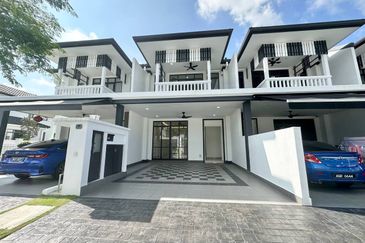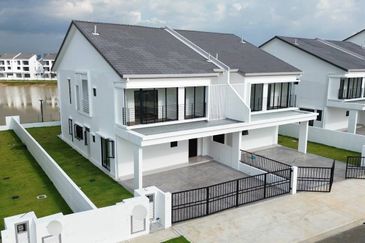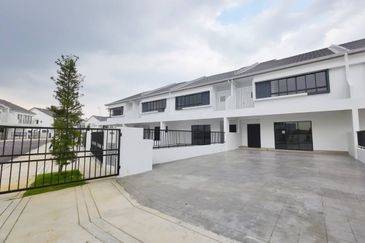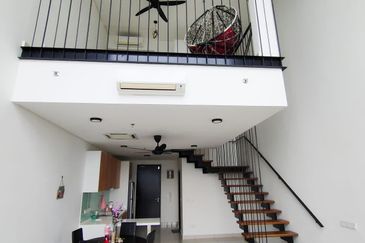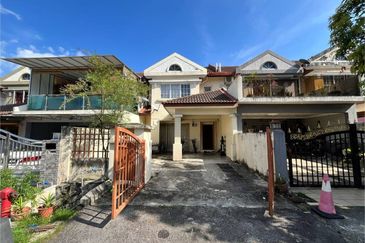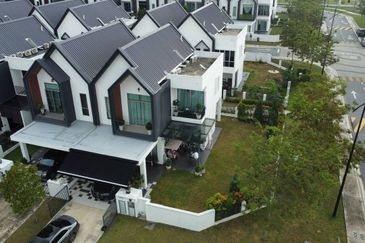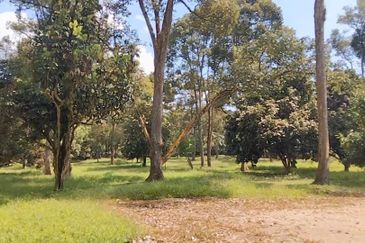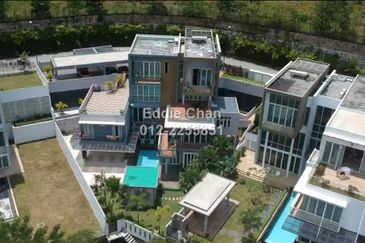BEIJING: Within days of Beijing announcing new measures to hose down the overheated property market, thousands of people have been flocking to housing shows in cities big and small across China.
It was enough to make policymakers sweat, and market analysts confused. Many such as Standard & Poor's and Samsung Securities foresee a drop in prices in the coming months. While S&P sees a 10% drop in first-tier cities in the next six to 12 months, Samsung Securities expects to see a similar drop as a result of the ongoing tightening measures.
But property agents said initial signals suggest buyers are still not taking the measures seriously. However, the impact of the latest policy measures on sales will not be known for several weeks until fresh data is available.
Numerous previous attempts to rein in runaway prices have failed because the prevailing view among home buyers is that central and local governments cannot afford to allow a sharp drop in prices because of the damage this will do to economic growth.
More than 200,000 people went to Shenzhen's five-day property show which opened in Oct 1, and in Shanghai more than 130,000 people visited a three-day housing exhibition (from Oct 3-7) — though developers said sales clinched during the show were down on last year.
Strong enthusiasm was also seen in Nanning , a capital city in Guangxi autonomous region in southern China, where around 10,000 home seekers visited a three-day property exhibition. That resulted in the sale of 853 units.
Official data show that, despite the numbers of visitors, the number of transactions in some cities tumbled from a week ago. For example, sales in Beijing city averaged 116 per day for the first three days of October, well below the average over the last four days of September, when 635, 852, 560 and 573 homes were sold, respectively.
But sales were much better than deals done during the three-day Labour Day holiday in May, a few weeks after the central government announced a 10-point austerity policy that included tightening lending and increasing home supply. During the May holiday only seven units in the private residential market in Beijing were reportedly sold.
In Changsha, in Hunan province, home buying remained strong this month according to Helen Lin Hongmei of Henderson China. "Since Oct 1, we continue to have buyers signing contracts," she said.
In a bid to cool housing prices further, on Sept 29 the central government suspended bank loans for third-home purchases effective from Oct 1, and said it planned to extend property taxes throughout the country. All first-home buyers must now also make a down payment of at least 30% of the purchase price.
The latest round of measures comes after both prices and sales' volumes started rebounding in August, four months after the market entered a trough.
"Mainlanders reacted relatively calmly this time, compared with reactions in April," said Xia Haijun, chief executive and vice chairman of one of the largest mainland developers, Evergrande Real Estate Group.
"Buyers did not disappear in a flash, as happened last time. Some buyers who needed flats to live in still came out to buy," he added, commenting on the sales response during the Golden Week holiday.
Evergrande executive director Lai Lixin said home seekers might become more cautious if more measures were released.
But their initial responses were calm as, according to Lai, they believed that the government did not really want home prices to fall drastically because property is a major growth engine for the country's gross domestic product (GDP).
Property investment accounts for four trillion yuan (RM1.85 trillion) a year, and accounted for 19% of the nation's fixed direct investment last year.
So buyers conclude the merry-go-around will be left to continue.
Prospective buyer Tan Tie is a typical example, believing that prices will not fall.
The 28 year-old IT products trader, plans to buy a two-bedroom unit when he marries at the end of this year.
"We have been monitoring the market since the beginning of the year. But prices have never come down," said Tan. He plans to buy a unit of below 90 square metres in the Jinsha district, an industrial zone of Changsha.
"We need a place to live," he said.
The prediction that prices will not come down is also based on a belief that developers, bankers and local governments had built a mutually beneficial relationship during housing reform — so that no one wanted to see home prices fall.
Stanley Ching, senior managing director and head of Citic Capital's real estate arm, said local governments had limited sources to raise revenue, and were unable, for instance, to issue bonds. Land sales revenues had become their core source of income, which made them reluctant to take measures to push land prices down.
Local government coffers have declined since tax reforms in 1994. Under the current tax system, the central government takes 75% of the total value-added taxes and sales and consumption taxes, which make up more than half of all government revenue.
The provincial governments take the biggest portion of the remaining 25%, leaving county and city governments — overburdened with social programmes and infrastructure building — financially overstretched, according to a report issued late last year by the Research Institute for Fiscal Science, of the Ministry of Finance.
Under the tax system land sales income is kept by local governments and that directly and indirectly accounted for about 60% of their total revenues, Evergrande's Lai said.
Meanwhile, banks are unlikely to slow down mortgage lending significantly as it is a major profit-making engine. As of 2009, the ratio of mortgage loans to total loans of the big four state-owned banks — ICBC, China Construction Bank, Agricultural Bank of China, and Bank of China — were 15.3%, 17.7%, 12%, and 18.5% respectively.
David Ng, regional property head of research at Royal Bank of Scotland said the September 30 measures provided a clear example of the government's hesitation to curb home prices.
"Both central and local governments seem hesitant to launch the final and supposedly most powerful cooling weapon, namely property tax," said Ng.
The Shanghai government announced the measures to respond to the central government's effort until the end of Golden Week. But it was still reluctant to give details about property taxes despite strong speculation on the matter over the last few months.
"This indicates indecision by the central government, which continues to resort to verbal re-iterations," said Ng.
Lee Wee Liat, regional property head of research at Samsung Securities, cited urbanisation and marriages as sources of constantly replenished demand. Every year more than 10 million people move to cities.
According to an official report released in late September, the urbanisation rate on the mainland reached 46.59% by the end of 2009 and in 2030 will reach 65% — similar to the level in western countries.
Samsung's Lee believes housing demand will be sustained at peak levels for another five years before it begins to taper. Urbanisation alone will generate a need for 4.1 million new homes, or 369 million sq m of new floor space per year, he said.
Marriages will generate a need for 3.5 million to 4.5 million new homes or 318 million to 400 million sq m of new floor space.
RBS's Ng said the existing measures would soon prove to be not strong enough and he expected to see tougher rules come out.
Other analysts put their bets on the "invisible hand" — the forces of supply and demand.
HSBC's latest research report estimates national residential space completion would increase 21% year on year to 700 million sq m in 2010, and further up 64% to 1.15 billion sq m in total floor area, which is 35% above the peak take-up rate of 853 million sq m achieved in 2009. Another focus of the government's property policy is on the roll-out of an affordable housing scheme.
This year, 611 million sq m of land will be set aside for the development of 5.8 million units of affordable housing, with 783 billion yuan reserved for investment in such housing.
Under the affordable housing programme local governments build cheaper flats, or subsidise developers by cutting land prices and in return developers offer flats for sale to those in the low-income group at discounted prices.
Thus far, 60% of the money has been invested, according to Samsung's latest released research report.
In September, the State Council issued a directive requiring all local governments to begin construction on all planned affordable housing schemes and added that 60% of such work must be completed by the end of this year.
The central government has thus far injected 70 billion yuan into development of affordable housing and set aside a further 10 billion yuan to reward local governments that make significant progress in this area.
The longer-term target set by the government is to complete 15.4 million units by end-2012. — South China Morning Post
It was enough to make policymakers sweat, and market analysts confused. Many such as Standard & Poor's and Samsung Securities foresee a drop in prices in the coming months. While S&P sees a 10% drop in first-tier cities in the next six to 12 months, Samsung Securities expects to see a similar drop as a result of the ongoing tightening measures.
But property agents said initial signals suggest buyers are still not taking the measures seriously. However, the impact of the latest policy measures on sales will not be known for several weeks until fresh data is available.
Numerous previous attempts to rein in runaway prices have failed because the prevailing view among home buyers is that central and local governments cannot afford to allow a sharp drop in prices because of the damage this will do to economic growth.
More than 200,000 people went to Shenzhen's five-day property show which opened in Oct 1, and in Shanghai more than 130,000 people visited a three-day housing exhibition (from Oct 3-7) — though developers said sales clinched during the show were down on last year.
Strong enthusiasm was also seen in Nanning , a capital city in Guangxi autonomous region in southern China, where around 10,000 home seekers visited a three-day property exhibition. That resulted in the sale of 853 units.
Official data show that, despite the numbers of visitors, the number of transactions in some cities tumbled from a week ago. For example, sales in Beijing city averaged 116 per day for the first three days of October, well below the average over the last four days of September, when 635, 852, 560 and 573 homes were sold, respectively.
But sales were much better than deals done during the three-day Labour Day holiday in May, a few weeks after the central government announced a 10-point austerity policy that included tightening lending and increasing home supply. During the May holiday only seven units in the private residential market in Beijing were reportedly sold.
In Changsha, in Hunan province, home buying remained strong this month according to Helen Lin Hongmei of Henderson China. "Since Oct 1, we continue to have buyers signing contracts," she said.
In a bid to cool housing prices further, on Sept 29 the central government suspended bank loans for third-home purchases effective from Oct 1, and said it planned to extend property taxes throughout the country. All first-home buyers must now also make a down payment of at least 30% of the purchase price.
The latest round of measures comes after both prices and sales' volumes started rebounding in August, four months after the market entered a trough.
"Mainlanders reacted relatively calmly this time, compared with reactions in April," said Xia Haijun, chief executive and vice chairman of one of the largest mainland developers, Evergrande Real Estate Group.
"Buyers did not disappear in a flash, as happened last time. Some buyers who needed flats to live in still came out to buy," he added, commenting on the sales response during the Golden Week holiday.
Evergrande executive director Lai Lixin said home seekers might become more cautious if more measures were released.
But their initial responses were calm as, according to Lai, they believed that the government did not really want home prices to fall drastically because property is a major growth engine for the country's gross domestic product (GDP).
Property investment accounts for four trillion yuan (RM1.85 trillion) a year, and accounted for 19% of the nation's fixed direct investment last year.
So buyers conclude the merry-go-around will be left to continue.
Prospective buyer Tan Tie is a typical example, believing that prices will not fall.
The 28 year-old IT products trader, plans to buy a two-bedroom unit when he marries at the end of this year.
"We have been monitoring the market since the beginning of the year. But prices have never come down," said Tan. He plans to buy a unit of below 90 square metres in the Jinsha district, an industrial zone of Changsha.
"We need a place to live," he said.
The prediction that prices will not come down is also based on a belief that developers, bankers and local governments had built a mutually beneficial relationship during housing reform — so that no one wanted to see home prices fall.
Stanley Ching, senior managing director and head of Citic Capital's real estate arm, said local governments had limited sources to raise revenue, and were unable, for instance, to issue bonds. Land sales revenues had become their core source of income, which made them reluctant to take measures to push land prices down.
Local government coffers have declined since tax reforms in 1994. Under the current tax system, the central government takes 75% of the total value-added taxes and sales and consumption taxes, which make up more than half of all government revenue.
The provincial governments take the biggest portion of the remaining 25%, leaving county and city governments — overburdened with social programmes and infrastructure building — financially overstretched, according to a report issued late last year by the Research Institute for Fiscal Science, of the Ministry of Finance.
Under the tax system land sales income is kept by local governments and that directly and indirectly accounted for about 60% of their total revenues, Evergrande's Lai said.
Meanwhile, banks are unlikely to slow down mortgage lending significantly as it is a major profit-making engine. As of 2009, the ratio of mortgage loans to total loans of the big four state-owned banks — ICBC, China Construction Bank, Agricultural Bank of China, and Bank of China — were 15.3%, 17.7%, 12%, and 18.5% respectively.
David Ng, regional property head of research at Royal Bank of Scotland said the September 30 measures provided a clear example of the government's hesitation to curb home prices.
"Both central and local governments seem hesitant to launch the final and supposedly most powerful cooling weapon, namely property tax," said Ng.
The Shanghai government announced the measures to respond to the central government's effort until the end of Golden Week. But it was still reluctant to give details about property taxes despite strong speculation on the matter over the last few months.
"This indicates indecision by the central government, which continues to resort to verbal re-iterations," said Ng.
Lee Wee Liat, regional property head of research at Samsung Securities, cited urbanisation and marriages as sources of constantly replenished demand. Every year more than 10 million people move to cities.
According to an official report released in late September, the urbanisation rate on the mainland reached 46.59% by the end of 2009 and in 2030 will reach 65% — similar to the level in western countries.
Samsung's Lee believes housing demand will be sustained at peak levels for another five years before it begins to taper. Urbanisation alone will generate a need for 4.1 million new homes, or 369 million sq m of new floor space per year, he said.
Marriages will generate a need for 3.5 million to 4.5 million new homes or 318 million to 400 million sq m of new floor space.
RBS's Ng said the existing measures would soon prove to be not strong enough and he expected to see tougher rules come out.
Other analysts put their bets on the "invisible hand" — the forces of supply and demand.
HSBC's latest research report estimates national residential space completion would increase 21% year on year to 700 million sq m in 2010, and further up 64% to 1.15 billion sq m in total floor area, which is 35% above the peak take-up rate of 853 million sq m achieved in 2009. Another focus of the government's property policy is on the roll-out of an affordable housing scheme.
This year, 611 million sq m of land will be set aside for the development of 5.8 million units of affordable housing, with 783 billion yuan reserved for investment in such housing.
Under the affordable housing programme local governments build cheaper flats, or subsidise developers by cutting land prices and in return developers offer flats for sale to those in the low-income group at discounted prices.
Thus far, 60% of the money has been invested, according to Samsung's latest released research report.
In September, the State Council issued a directive requiring all local governments to begin construction on all planned affordable housing schemes and added that 60% of such work must be completed by the end of this year.
The central government has thus far injected 70 billion yuan into development of affordable housing and set aside a further 10 billion yuan to reward local governments that make significant progress in this area.
The longer-term target set by the government is to complete 15.4 million units by end-2012. — South China Morning Post
SHARE
TOP PICKS BY EDGEPROP
RENT
FEATURED

Desa ParkCity (SouthLake)
Desa ParkCity, Kuala Lumpur
RM 6,000
3 beds |
3 bath |
2200 sqft
SALE
FEATURED

Mewah View Luxurious Apartments
Johor Bahru, Johor
RM 320,000
3 beds |
3 bath |
1262 sqft

